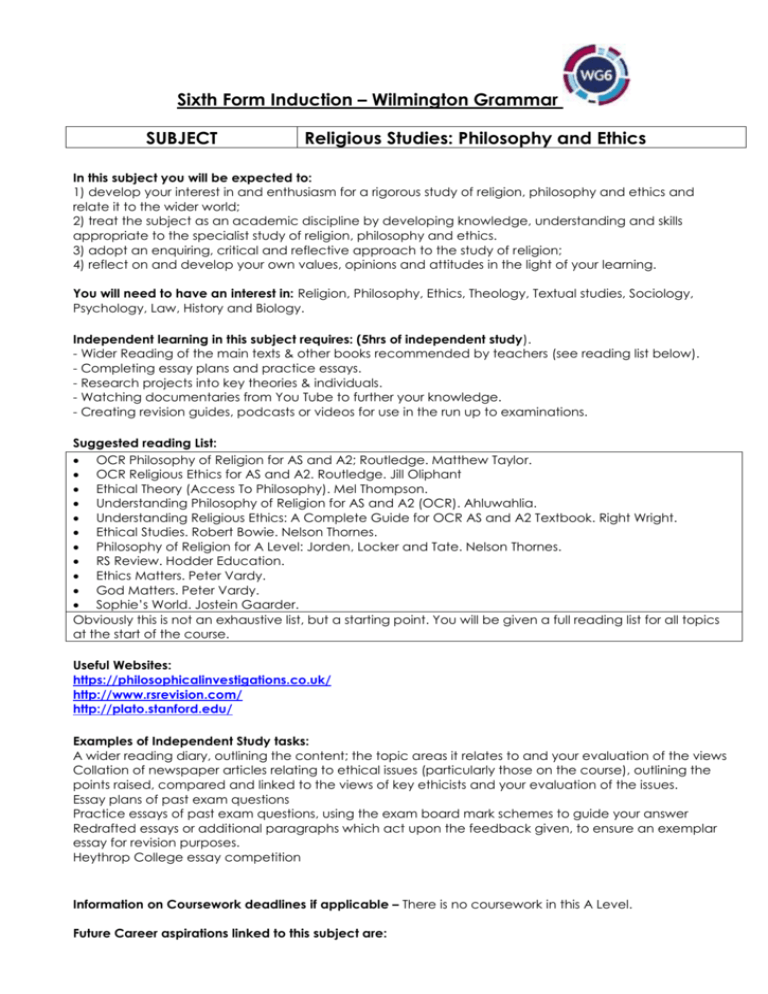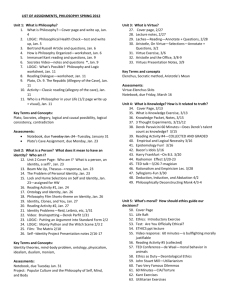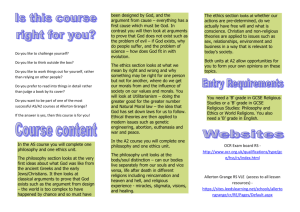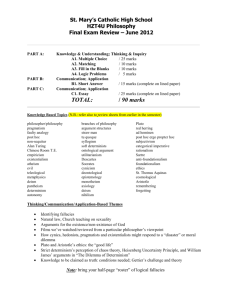RS – Philosophy & Ethics - Wilmington Grammars' Sixth Form. WG6
advertisement

Sixth Form Induction – Wilmington Grammar SUBJECT Religious Studies: Philosophy and Ethics In this subject you will be expected to: 1) develop your interest in and enthusiasm for a rigorous study of religion, philosophy and ethics and relate it to the wider world; 2) treat the subject as an academic discipline by developing knowledge, understanding and skills appropriate to the specialist study of religion, philosophy and ethics. 3) adopt an enquiring, critical and reflective approach to the study of religion; 4) reflect on and develop your own values, opinions and attitudes in the light of your learning. You will need to have an interest in: Religion, Philosophy, Ethics, Theology, Textual studies, Sociology, Psychology, Law, History and Biology. Independent learning in this subject requires: (5hrs of independent study). - Wider Reading of the main texts & other books recommended by teachers (see reading list below). - Completing essay plans and practice essays. - Research projects into key theories & individuals. - Watching documentaries from You Tube to further your knowledge. - Creating revision guides, podcasts or videos for use in the run up to examinations. Suggested reading List: OCR Philosophy of Religion for AS and A2; Routledge. Matthew Taylor. OCR Religious Ethics for AS and A2. Routledge. Jill Oliphant Ethical Theory (Access To Philosophy). Mel Thompson. Understanding Philosophy of Religion for AS and A2 (OCR). Ahluwahlia. Understanding Religious Ethics: A Complete Guide for OCR AS and A2 Textbook. Right Wright. Ethical Studies. Robert Bowie. Nelson Thornes. Philosophy of Religion for A Level: Jorden, Locker and Tate. Nelson Thornes. RS Review. Hodder Education. Ethics Matters. Peter Vardy. God Matters. Peter Vardy. Sophie’s World. Jostein Gaarder. Obviously this is not an exhaustive list, but a starting point. You will be given a full reading list for all topics at the start of the course. Useful Websites: https://philosophicalinvestigations.co.uk/ http://www.rsrevision.com/ http://plato.stanford.edu/ Examples of Independent Study tasks: A wider reading diary, outlining the content; the topic areas it relates to and your evaluation of the views Collation of newspaper articles relating to ethical issues (particularly those on the course), outlining the points raised, compared and linked to the views of key ethicists and your evaluation of the issues. Essay plans of past exam questions Practice essays of past exam questions, using the exam board mark schemes to guide your answer Redrafted essays or additional paragraphs which act upon the feedback given, to ensure an exemplar essay for revision purposes. Heythrop College essay competition Information on Coursework deadlines if applicable – There is no coursework in this A Level. Future Career aspirations linked to this subject are: RS, Philosophy and Ethics teaches you skills of evaluation and analysis which are applicable to almost any walk of life. It is not just about what others think; it is about learning to think for yourself. According to AGCAS – the association of Graduate Careers Advisory Service, RS/Theology graduates go into a wide range of careers. However, they, and employers, feel that it particularly prepares students for the following careers: Financial services, Legal sector (Law), Politics, Consultancy, Jour nalism, Education, Social care, community work. And that’s not all. The skills you will develop will benefit you in any area involving working with other showing initiative thinking for yourself… that’s just about anything! Induction Task & Success Criteria Deadline Please see the attached task. There are various steps that you need to go through, but the final piece should a balanced answer based on the writing frame provided. A success criteria is also provided to show what level you need to reach. If you are having problems with the task and need some advice please contact either dwalters@wgsb.org.uk or scarter@wgsg.co.uk First lesson in September A Level Religious Studies: Philosophy and Ethics Induction Task ‘Philosophy begins in wonder’ Plato Introduction Plato and Aristotle both aim to understand what remains constant in our ever changing world. Your task is to investigate the theories each philosopher puts forward to answer this question. You should try to primarily use Jostein Gaardner’s Sophie’s World. Your answers need to presented in a written form, and should be a maximum of 2 sides of A4. Your answers should be supported by relevant and purposeful quotes from Sophie’s World (Plato pf 67 and Aristotle pg 88). Below are some key terms and information that can help you in your task. Answer the following two questions: AO1 -Explain and compare Plato and Aristotle’s theories of how knowledge is acquired. (25 marks) – DO NOT evaluate in this question. A01 – Knowledge and Understanding Grade Band 5 21-25 A - 21 B - 18 C - 15 D – 12 E - 10 4 3 16-20 11-15 Descriptors An excellent attempt to explain how Plato and Aristotle say we gain knowledge showing understanding and engagement with the material; very high level of ability to select and deploy relevant information, accurate use of technical terms. Communication: answer is well constructed and organised A good attempt to address the question, accurate knowledge, good understanding, good selection of material, technical terms mostly accurate. Communication: generally clear and organised A satisfactory attempt to address the question; some accurate knowledge, evidence of appropriate understanding, some successful selection of material, some accurate use of technical terms. Communication: some clarity and organisation A02 - In an ever changing world, can we ever have true knowledge? (10 marks) A02 – Analysis, evaluation and application 5 9-10 An excellent attempt which uses a range of evidence to sustain an argument, comprehends the demands of the question, shows understanding and critical analysis of different viewpoints Communication: answer is well constructed and organised. 4 7-8 A good attempt at using evidence to sustain an argument, some successful and clear analysis, likely to put more than one point of view. Communication: generally clear and organised. 3 5-6 The argument is sustained and justified, some successful analysis which may be implicit through choice of material. Communication: some clarity and organisation. A- 8 B- 7 C- 6 D–5 E-4








